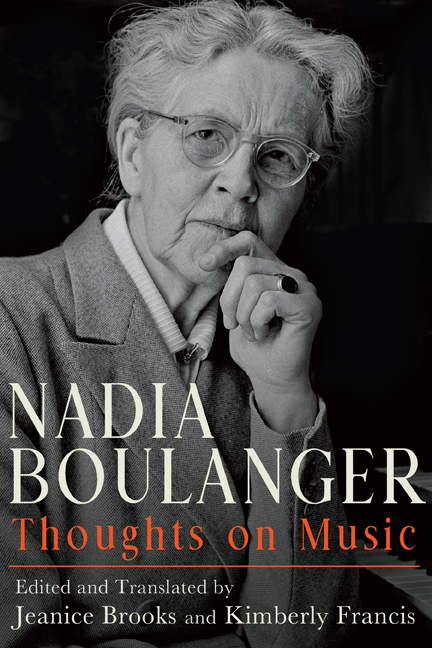Book contents
- Frontmatter
- Contents
- List of Illustrations
- Acknowledgments
- Editorial Apparatus and Critical Notes
- Note on Translations
- List of Abbreviations
- Timeline of Nadia Boulanger’s Life
- Introduction
- Part One Journalism, Criticism, Tributes
- Part Two Lectures, Classes, Broadcasts
- Bibliography of Nadia Boulanger’s Published Writing
- General Bibliography
- Index
In Memoriam: Jean Binet, untitled Contribution to Jean Binet. 17 octobre 1893-24 février 1960. Nyon: Courrier de la Côte, 1961, 19-21 (complete text)
Published online by Cambridge University Press: 15 October 2020
- Frontmatter
- Contents
- List of Illustrations
- Acknowledgments
- Editorial Apparatus and Critical Notes
- Note on Translations
- List of Abbreviations
- Timeline of Nadia Boulanger’s Life
- Introduction
- Part One Journalism, Criticism, Tributes
- Part Two Lectures, Classes, Broadcasts
- Bibliography of Nadia Boulanger’s Published Writing
- General Bibliography
- Index
Summary
Jean Binet was exquisite, sensitive, deep. His vast culture had something aristocratic about it. Rather than promoting himself, he chose more often to hide himself, to erase himself. His modesty was a gentler form of his supreme dignity.
Such humility only rendered more sensitive the vigour of his intelligence and the warmth of his heart, which was always ready to open itself so as to give and receive.
By his presence, by his words, even by his silence—because he had the ability to listen and to understand—Jean Binet immediately put the person with whom he was speaking at ease. He spread around him the gifts of a humane and understanding kindness, and in him could be discovered all that he caused to emerge from others, through his desire to lose nothing, to neglect nothing of what one could be.
There was nothing affected about his demeanor. Such attention was nothing more than a reflection of his respect. He respected people and things, instinctively and because nothing was unimportant in his eyes. He welcomed life with a continuous attention. This respect, this awareness, this integrity, this sensitivity, we found them in the musician, whatever form his thoughts might take. His ideas changed, they evolved, but essential traits remained the same, assuring unity within such a diverse output. Beautiful texts, chosen with an infallible taste, showed us the scope of his knowledge, of his curiosity, of Jean Binet's poetic point of view.
The spontaneity that characterised the man can also be found in all of his work. The moment will come to speak of his work as one should, and to distinguish one from the other. But Jean Binet has just left us: shouldn't we pause over the images that others will no longer be able to see? Before his work is severed from him forever, one must say how much it represents and reflects him; he who was so noble and so charming. One could not approach him without being struck by his personality. Who among us can forget his slender, tall, vigorous stature; his tremendously gentle and extremely attentive gaze; his smile full of goodness, at times of wit; his beautiful, neat, solid hands; his welcoming gestures, without being overly familiar; all these traits where one could read intelligence, heart, and thoughtfulness?
- Type
- Chapter
- Information
- Nadia BoulangerThoughts on Music, pp. 306 - 307Publisher: Boydell & BrewerPrint publication year: 2020



